|
|
|
|
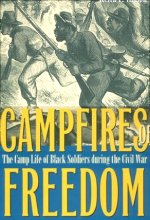 Campfires of Freedom: The Camp Life of Black Soldiers During the Civil War African-Americans - both freemen and ex-slaves - enlisted for a variety of reasons, from patriotism to sheer poverty. Like many of their white counterparts, they attributed theological significance to the war Kindle Available 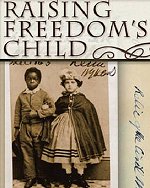 Raising Freedom's Child: Black Children and Visions of the Future After Slavery Previously untapped documents and period photographs casts a dazzling, fresh light on the way that abolitionists, educators, missionaries, planters, politicians, and free children of color envisioned the status of African Americans after emancipation Colored Troop Books 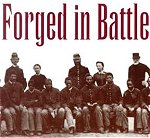 Forged in Battle: The Civil War Alliance of Black Soldiers and White Officers This historical exploration denotes the uneasy alliance between black soldiers and white officers who, divided by racial tension and ideology, were united by the trials and bonds of the war they fought side by side 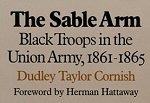 The Sable Arm: Black Troops in the Union Army, 1861-1865 The first work to fully chronicle the remarkable story of the nearly 180,000 black troops who served in the Union army. This work paved the way for the exploration of the black military experience in other wars. This edition, with a new foreword by Herman Hattaway and bibliographical essay by the author, makes available once again a pioneering work that will be especially useful for scholars and students 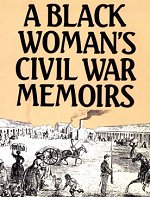 A Black Woman's Civil War Memoirs: Reminiscences of My Life in Camp With the 33rd U.S. Colored Troops, Late 1st South Carolina Volunteers Taylor was born a slave in 1848 on an island off the coast of Georgia. She gained her freedom and worked as a laundress for an African-American Union regiment during the war. She offers fascinating details about her life with the troops |
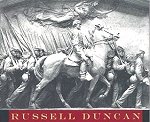 Where Death and Glory Meet: Colonel Robert Gould Shaw and the 54th Massachusetts Infantry The history of how our culture determines manhood. Although a rather detached supporter of abolition, Shaw was skeptical about the fighting abilities of freedmen, and initially declined the command. When he did accept, he was aware that the eyes of the nation were on his regiment, and his training of them was relentless. The 54th measured up by proving itself in battle Kindle Available 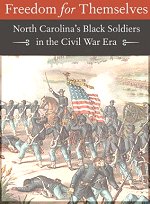 Freedom for Themselves: North Carolina's Black Soldiers in the Civil War Era The processes by which black men enlisted and were trained, the history of each regiment, the lives of the soldiers' families during the war, and the experiences of the colored veterans and their families living in an ex-Confederate state 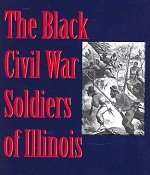 The Black Civil War Soldiers of Illinois: The Story of the Twenty-Ninth U.S. Colored Infantry Study in the lives of black recruits in the Civil War era, and a journey into the hinterlands of an American racial pathos. Throughout this study, Miller explores in detail the biographies of individual soldiers, revealing their often convoluted histories  Strike the Blow for Freedom: The 6th United States Colored Infantry in the Civil War The recruitment, training, battles and finally the mustering out of the 6th. The 6th shared some of the same influences that shaped the formation of many military units of that time 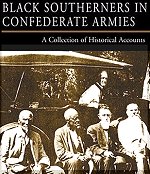 Black Southerners in Confederate Armies Official records, newspaper articles, and veterans' accounts to tell the stories of the Black Confederates. This well researched collection is a contribution to the discussion about the numbers of black Southerners involved and their significant history. 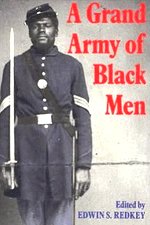 A Grand Army of Black Men: Letters from African-American Soldiers in the Union Army 1861-1865 Almost 200,000 African-American soldiers fought for the Union in the Civil War. Although most were illiterate ex-slaves, several thousand were well educated, free black men from the northern states |
District of Columbia. Company E, 4th US Colored Infantry at Fort Lincoln Black slaves who fled to Union lines, or "contrabands," often proved themselves extremely useful, even before the government enlisted them into service. A group of "contrabands" appear on this calling card. Calling cards, or cartes de visite, with photographs were popular during this era partly because photography was relatively new and the cards provided a means of sharing likenesses with friends and relatives. This one includes images of white officers of the 2nd Rhode Island Camp at Camp Brightwood in the District of Columbia. On the left is Capt. B. S. Brown. In the center is Lt. John P. Shaw, killed in action at the Wilderness, Virginia, May 5, 1864, and on the right is Lt. T. Fry. The "contrabands" with them are not named. A group of "contrabands." [Stereograph]
ca.1861 published later 29th Regiment from Connecticut |
Colored Troops
Colored Troops Pictures
American Civil War Exhibits
Women in the War
Civil War Cooking
Civil War Submarines
Kids Zone Underground Railroad
Kids Zone Causes of the War
Dred Scott Decision
Benjamin Oliver Davis First Colored U.S. General
"A Black Woman's Civil War Memoirs," by Susie King Taylor, was Taylor was born a slave in 1848 on an island off the coast of Georgia. She gained her freedom and worked as a laundress for an African-American Union regiment during the war. Taylor recalls how she learned to read and write and then herself became a teacher. She offers fascinating details about her life with the troops. She had many different duties beyond laundry service. I loved the episode where she recalls concocting "a very delicious custard" from turtle eggs and canned condensed milk, and serving it to the troops. Taylor condemns the lack of appreciation shown for both black and white Civil War veterans. She also condemns early 20th century racism. Reading her book I was reminded of W.E.B. Du Bois' classic "The Souls of Black Folk," which was first published around the same time; I think the two books complement each other well. Taylor ends on a note of hope and pride, noting "my people are striving" for better lives. This book is, in my opinion, an important milestone in African American literature.
|
In the summer of 1865, a former slave by the name of Jourdan Anderson sent a letter to his former master. And 147 years later, the document reads as richly as it must have back then. This letter was dictated and sent to the New York Times in addition to Mr. Anderson |
| Dayton, Ohio,
August 7, 1865 To My Old Master, Colonel P.H. Anderson, Big Spring, Tennessee Sir: I got your letter, and was glad to find that you had not forgotten Jourdon, and that you wanted me to come back and live with you again, promising to do better for me than anybody else can. I have often felt uneasy about you. I thought the Yankees would have hung you long before this, for harboring Rebs they found at your house. I suppose they never heard about your going to Colonel Martin's to kill the Union soldier that was left by his company in their stable. Although you shot at me twice before I left you, I did not want to hear of your being hurt, and am glad you are still living. It would do me good to go back to the dear old home again, and see Miss Mary and Miss Martha and Allen, Esther, Green, and Lee. Give my love to them all, and tell them I hope we will meet in the better world, if not in this. I would have gone back to see you all when I was working in the Nashville Hospital, but one of the neighbors told me that Henry intended to shoot me if he ever got a chance. I want to know particularly what the good chance is you propose to give me. I am doing tolerably well here. I get twenty-five dollars a month, with victuals and clothing; have a comfortable home for Mandy,—the folks call her Mrs. Anderson,—and the children—Milly, Jane, and Grundy—go to school and are learning well. The teacher says Grundy has a head for a preacher. They go to Sunday school, and Mandy and me attend church regularly. We are kindly treated. Sometimes we overhear others saying, "Them colored people were slaves" down in Tennessee. The children feel hurt when they hear such remarks; but I tell them it was no disgrace in Tennessee to belong to Colonel Anderson. Many darkeys would have been proud, as I used to be, to call you master. Now if you will write and say what wages you will give me, I will be better able to decide whether it would be to my advantage to move back again. As to my freedom, which you say I can have, there is nothing to be gained on that score, as I got my free papers in 1864 from the Provost-Marshal-General of the Department of Nashville. Mandy says she would be afraid to go back without some proof that you were disposed to treat us justly and kindly; and we have concluded to test your sincerity by asking you to send us our wages for the time we served you. This will make us forget and forgive old scores, and rely on your justice and friendship in the future. I served you faithfully for thirty-two years, and Mandy twenty years. At twenty-five dollars a month for me, and two dollars a week for Mandy, our earnings would amount to eleven thousand six hundred and eighty dollars. Add to this the interest for the time our wages have been kept back, and deduct what you paid for our clothing, and three doctor's visits to me, and pulling a tooth for Mandy, and the balance will show what we are in justice entitled to. Please send the money by Adams's Express, in care of V. Winters, Esq., Dayton, Ohio. If you fail to pay us for faithful labors in the past, we can have little faith in your promises in the future. We trust the good Maker has opened your eyes to the wrongs which you and your fathers have done to me and my fathers, in making us toil for you for generations without recompense. Here I draw my wages every Saturday night; but in Tennessee there was never any pay-day for the negroes any more than for the horses and cows. Surely there will be a day of reckoning for those who defraud the laborer of his hire. In answering this letter, please state if there would be any safety for my Milly and Jane, who are now grown up, and both good-looking girls. You know how it was with poor Matilda and Catherine. I would rather stay here and starve—and die, if it come to that—than have my girls brought to shame by the violence and wickedness of their young masters. You will also please state if there has been any schools opened for the colored children in your neighborhood. The great desire of my life now is to give my children an education, and have them form virtuous habits. Say howdy to George Carter, and thank him for taking the pistol from you when you were shooting at me. From your old servant, Jourdon Anderson. |
Sources:
U.S. National Park Service
U.S. Library of Congress.
|
Books Civil War Womens Subjects Young Readers Military History DVDs Confederate Store Civil War Games Music CDs Reenactors |